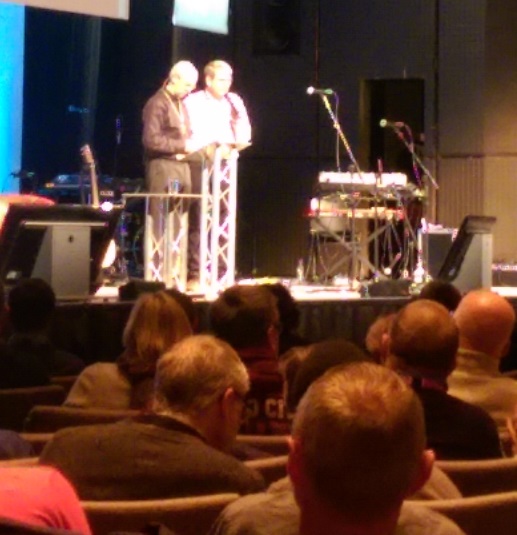New Wine Leadership Conference 2016

Archbishop Justin Welby with John Coles
Correction comes to deal with those things that others know about you that you cannot see for yourself. If correction is received badly, we can stagnate. But if received well, it can be for our growth (Heb 6:12). Kate encouraged me to think about those others, within my current church, who are carrying the wisdom of God for me and blessed with my Lay leader wardens, I knew immediately who it was I was being asked to give thanks to God for. We develop only with the help of others. We are to give people permission to speak into our lives and we are to listen. Jethro insisted that his son-in-law, Moses, share the leadership load and collaborate.
The remaining speakers seemed to me to say something to me about this very idea of collaboration, sharing the leadership load, about legacy, how I am to pass on a baton and whether I love God more than I love the vision he has given me of what is possible.
Justin Welby began with a synopsis of our current instability, the secularist agenda, the acceptance that there are no absolutes except that there are no absolutes which is, of course, an absolute. He made the congregation laugh with this. My best friend and colleague through theological college shared with me her reflections, similar to my own, that we hadn’t known our A B of C to have such a sense of humour. ‘There’s our boss,’ she said, ‘I never knew he was so hilarious.’ Like Nicky Gumble, Justin Welby focussed on the absolute confidence we should have in the God who has raised Jesus from the dead; that as Christians we swim well in a secular sea of uncertainty and are not intimidated when Jesus’ first words coming to the disciples over the water are those cautioning them against fear.
He referenced Westerhoff’s ‘Will our Children have Faith?’ to describe how the Christian community must have a sense of the past, the present reality of God and the God who is to come. New Wine is called to remember its past in shaping the Anglican church and its influence on Justin Welby himself was acknowledged.
We are, though, to stay alert to what God is doing presently and not dwell in the past because God is always doing a new thing. The long years of winter in the Church of England are thawing and a new spring is coming. This was the phrase on everyone’s lips for the rest of the conference and it seemed to have a very prophetic weight about it.
Quest not for great leaders but become a people that are holy and transparent.

Charlotte Gambill
This led on neatly to Charlotte Gambill’s exploration of the dysfunctionality of the church. She was going to dare to talk about awkwardness in ministry and tensions between teams of people leading. She explored the difficult conversations we have to have and how Jesus had incredibly hard conversations with his disciples. She focussed on Elijah and Elisha, how Elijah dealt with his issues, wanting at first to give up but listened to God, wanting to lie down under the tree and quit he was encouraged to eat, simply that. God cares about our everyday needs. We get tired and he cares – we have to know that becoming tired is expected and Jesus provides for this, telling us to find rest in him. We are all tempted to just lie down under a tree sometimes but tiredness shrinks our vision as it causes our eyes to droop; we see disappointment far more obviously; our focus gets skewed. I could relate to this having been only recently cured of workaholic tendencies that cost me my health at times in my last post and during my former vocation as a secondary school teacher. God has given back to me that capacity for joy from the other calls in my life that I had lost temporarily as I got busy for God. The life I lead now pastoring a church as an Anglican vicar is much more of a balanced one. I could relate to Charlotte’s insight that God’s answer is not always super spiritual, he answers in the natural and sometimes simply recommends food and rest. I have had times when I have not listened to this in the past and learnt some heavy lessons along the way.
Category: In Depth, Spring 2016


